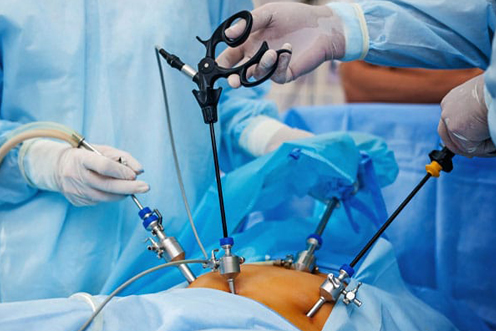Laparoscopic Surgery for the Kidneys and the Urinary Tract
Laparoscopic surgery is a minimally invasive surgical technique used to treat a variety of kidney and urinary tract disorders. Understanding laparoscopic surgery can help patients make informed decisions about their treatment options.

What is Laparoscopic Surgery?
Laparoscopic surgery, also known as keyhole surgery, is a surgical technique that uses small incisions and specialized instruments to perform procedures. It allows surgeons to operate with greater precision and less trauma to the surrounding tissues compared to traditional open surgery.
Advantages of Laparoscopic Surgery
Some of the advantages of laparoscopic surgery include:
- Smaller incisions: Laparoscopic surgery requires smaller incisions than traditional open surgery, resulting in less scarring and faster recovery.
- Reduced pain and discomfort: Patients undergoing laparoscopic surgery often experience less pain and discomfort compared to open surgery.
- Shorter hospital stay: Most patients undergoing laparoscopic surgery can go home the same day or after a short hospital stay.
- Quicker recovery: Recovery after laparoscopic surgery is generally faster than after open surgery, allowing patients to return to their normal activities sooner.
Indications for Laparoscopic Surgery in Kidney and Urinary Tract Disorders
Laparoscopic surgery may be recommended for patients with various kidney and urinary tract disorders, including kidney stones, kidney tumors, ureteral strictures, and adrenal tumors.
Preparation for Laparoscopic Surgery
Before undergoing laparoscopic surgery, patients may need to undergo various tests and procedures to assess their overall health and the specific condition being treated. They may also be advised to stop taking certain medications and to fast for a period before the procedure.
Types of Laparoscopic Procedures
There are several types of laparoscopic procedures used to treat kidney and urinary tract disorders, including:
- Laparoscopic nephrectomy: Removal of a kidney.
- Laparoscopic pyeloplasty: Repair of a blockage in the ureteropelvic junction.
- Laparoscopic ureterolithotomy: Removal of a ureteral stone.
- Laparoscopic adrenalectomy: Removal of an adrenal gland.
Procedure of Laparoscopic Surgery
During laparoscopic surgery, several small incisions are made in the abdomen, and a laparoscope (a thin, flexible tube with a camera) is inserted through one of the incisions. The surgeon uses the images from the camera to guide the surgical instruments and perform the procedure.
Benefits and Risks of Laparoscopic Surgery
Laparoscopic surgery offers several benefits, including less scarring, reduced pain, and faster recovery. However, like any surgical procedure, it carries some risks, including bleeding, infection, and damage to surrounding tissues.
Recovery After Laparoscopic Surgery
Recovery after laparoscopic surgery is generally quicker than after open surgery. Most patients can return to their normal activities within a few days to a week after the procedure, depending on the type of surgery performed.
Follow-up Care and Monitoring
After laparoscopic surgery, patients may need to undergo regular follow-up appointments to monitor their recovery and ensure that the underlying condition is effectively treated.
Hyderabad MultiSpeciality Hospital's Expertise in Laparoscopic Surgery
At Hyderabad MultiSpeciality Hospital, we have a team of highly skilled surgeons who specialize in performing laparoscopic surgery for kidney and urinary tract disorders. Our state-of-the-art facilities and advanced technologies ensure that patients receive the best possible care during their procedures.
Advanced Technologies Used in Laparoscopic Procedures
Our hospital is equipped with the latest technologies for performing laparoscopic surgery, including high-definition cameras and specialized surgical instruments. These technologies allow our surgeons to perform laparoscopic procedures with precision and accuracy.
Patient Experiences and Success Stories
Patient experiences and success stories highlight the positive outcomes of laparoscopic surgery and the impact it has had on their lives. These stories provide valuable insight into the effectiveness of laparoscopic surgery and can help other patients feel more confident about their treatment choice.
Frequently Asked Questions About Laparoscopic Surgery
1. How long does laparoscopic surgery take?
The length of time it takes to perform laparoscopic surgery can vary depending on the complexity of the procedure. In general, most laparoscopic procedures take between one to three hours to complete.
2. Will I have scars after laparoscopic surgery?
Laparoscopic surgery typically results in smaller scars than traditional open surgery. The incisions are usually less than one inch in length and are often barely noticeable once they have healed.
Cost and Insurance Coverage for Laparoscopic Surgery
The cost of laparoscopic surgery can vary depending on the specific procedure being performed and the hospital where it is performed. Patients are advised to check with their insurance provider to determine if laparoscopic surgery is covered under their plan.
Contact Us for More Information About Laparoscopic Surgery
- If you have any questions about laparoscopic surgery or would like to schedule a consultation, please contact us at Hyderabad MultiSpeciality Hospital. Our team of experts is here to help you understand your treatment options and provide you with the care you need.
